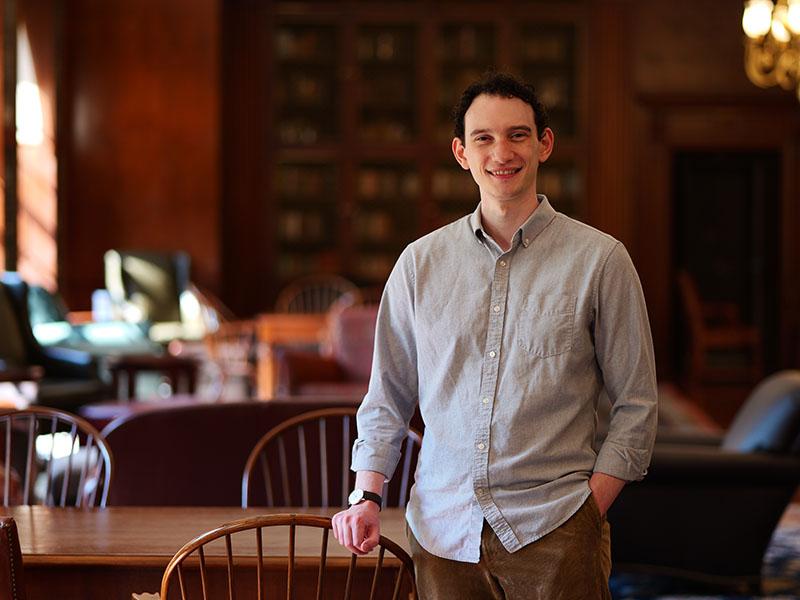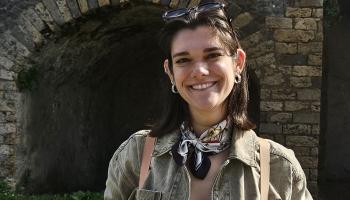Exploring the Roots of U.S. Global Power in the Postwar Era

As a doctoral candidate in the University of Virginia’s Department of History, Justin Winokur is shedding new light on one of American foreign policy’s most consequential periods. In a dissertation he’ll complete as a predoctoral fellow at Harvard Kennedy School, Winokur explores how a generation of U.S. policymakers reshaped the nation’s role in the world after World War II — changes that still reverberate in global politics today.
Tentatively titled Relentless Struggle: The American National Security State, 1945–1963, Winokur’s work examines the deliberate effort by U.S. state builders to create a political, institutional, economic and cultural system capable of sustaining a powerful global military presence.
“It was the most fundamental transformation in American foreign relations in our history,” Winokur said. “In the decades after World War II, American state builders set out to create a new system that could sustain a powerful global military indefinitely, something that had never existed in American history before.”
The resulting changes, he argues, not only recast U.S. grand strategy but helped create a new kind of American society — one in which military strength and global leadership became normalized. What’s more, Winokur concludes that those changes were not just shaped by an elite group of lawmakers but by political input from every level of American society.
The Norman A. Graebner Bicentennial Fellow for academic years '23-'24 and '24-'25, Winokur's research draws on his academic training and real-world experience. Before enrolling at UVA, he worked at Harvard Kennedy School as a research assistant to political scientist Graham Allison. He helped run the school’s Applied History Project, a program aimed at illuminating current policy challenges and choices by understanding their historical precedents. That experience — as well as interactions with senior government officials and policy leaders at the U.S. Department of State and the Department of Defense — cemented his interest in history’s role in shaping public decision-making.
Already an influential voice in the field of global politics, Winokur recently published an article in Foreign Affairs called “The Cold War Trap,” which explores how outdated expectations of American global influence are hampering effective U.S. foreign policy in the 21st century.
“The goal of my work,” Winokur explained, “is to help Americans understand how and why the United States uses its military, diplomatic and economic power to shape world affairs.”
Knowing how that system came about, why, and what’s changed, he added, is essential to policy makers who need to make thoughtful choices about how the nation will use that power in the future.
Christa Acampora, dean of the College and Graduate School of Arts & Sciences, said Winokur’s work represents the Graduate School’s priority of strengthening the impact of research to benefit society. “Justin’s scholarship offers important historical insights into modern policy dilemmas,” she said. “It reminds us of how the past continues to shape our present and future. This cross-disciplinary, publicly engaged scholarship also demonstrates the power of the humanities to inform today’s most urgent conversations.”
William I. Hitchcock, UVA’s James Madison Professor of History and director of the University’s interdisciplinary research initiative, Governing America in a Global Era, praised Winokur as a meticulous, careful historian with an interest in applying what he knows to illuminate questions America faces today.
“Justin is going ‘under the hood’ of what Eisenhower called the ‘military-industrial complex’ to show exactly how it was built, and how policymakers, the military and Congress built it,” Hitchcock said. “He’s untangling the wiring of the national security state that was invented in the 1940s and 1950s to help answer questions like Why do we need or want a large permanent military? Is such a permanent defense system consistent with democracy? And how has this large warfare state impacted our society, our economy our foreign policy?”
Winokur credits his time at UVA for helping shape both the questions he asks and the methods he uses to answer them.
“I’ve had the privilege of learning from some of the country’s leading scholars in American and international history,” he said. “At UVA, I was also able to engage with the public policy community, which helped me connect my historical research to real-world concerns.”
Ultimately, Winokur hopes his work will broaden public understanding of U.S. power and its implications.
“Grand strategy in the U.S. isn’t something that just happens in the executive branch. It’s a product of every component of society,” he said. “My research tries to understand the process of our democracy engaging with the world.”







